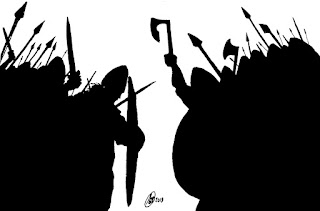Men went to Gododdin, laughter-inciting,Long after the Legions left, the islands faced a new future free from the influence and order of Rome. Many new kingdoms came into being, while others reawakened old memories.
Bitter in battle, with blades set for war.
Brief the year they were at peace.
The son of Bodgad, by the deeds of his hand
did slaughter.
Though they went to churches to do penance,
The young, the old, the lowly, the strong,
True is the tale, death oer’took them.
Men went to Gododdin, with eager laughter,
Attacking in an army, cruel in battle,
They slew with swords without much sound
Rheithfyw, pillar of battle, took pleasure in giving.
Men went to Catraeth, swift was their host.
Fresh mead was their feast, their poison too.
Three hundred waging war, under command,
And after joy, there was silence.
Though they went to churches to do penance,
True is the tale, death oer’took them.
Men went to Catraeth, mead-nourished,
Sturdy and strong, it would be wrong should I not praise them.
Amid blood-red blades in dark-blue sockets,
The war-hounds fought fiercely, tight formation.
Of the war-band of Brennych, I would have thought it a burden,
to leave any in the shape of a man alive.
A friend I have lost; faithful I was.
Swift in the struggle, it grieves me to leave him.
The brave one desired no father-in-law’s dowry,
The son of Cian from Maen Gwyngwn.
Men went to Catraeth with the dawn.
Their fears left them,
A hundred thousand and three hundred clashed together.
They stained their spears, splashed with blood,
He was at the forefront, foremost in battle,
Before the retinue of Mynyddog Mwynfawr.
Men went to Catraeth with the dawn.
Their bravery cut short their lives.
They drank yellow mead, sweet, ensnaring,
For the space of a year the minstrel was merry.
Red their swords, let them not be cleansed;
Their shields were white, their spearheads four-edged,
Before the retinue of Mynyddog Mwynfawr.
Men went to Catraeth with the day,
He made certain the shame of armies.
They made it certain biers would be needed,
With blades the cruelest in all the world.
Rather than speak of truce, he made
A blood-bath and death for his enemy.
Before the army of Gododdin, when he went,
Brave Neirthiad accomplished a splendid intent.
A man went to Catraeth with the day–
He gulped mead at midnight feasts.
Wretched, a lamentation for his fellows,
Was his attack, ireful killer.
There rushed to Catraeth
no great one so generous,
in his purpose [?]
There was none who more completely
From the fortress of Eidyn,
Scattered the enemy.
Tudfwlch Hir from his land and his villages,
Slew Saxons each seven-day,
Long will his valour endure,
And his memory among his fair company.
When Tudflwch was there, his people’s pillar,
Bloody was the place of spears, son of Cilydd.
A man went to Catraeth with the dawn,
About him a fort, a fence of shields.
Harshly they attacked, gathered booty,
Loud like thunder the noise of the shields.
A proud man, a wise man, a strong man,
He fought and pierced with spears,
Above the blood, he slew with swords.
In the strife, with hard weapons on heads.
In the court the warrior was humble,
Before Erthgi great armies would groan.
Three hundred gold-torqued men attacked,
Guarding their land, bloody was the slaughter,
Although they were slain, they slew;
And until the end of the world they will be honoured.
And of all of us kinsmen who went together,
Sad, but for one man, none escaped.
Three hundred gold-torqued,
warlike, wonderful [~]
Three hundred proud ones,
Together, armed;
Three hundred fierce horses
Carried them forward,
Three hounds and three hundred,
Sad, they did not return.
He pierced three hundred, most bold,
He cut down the centre and wing.
He was worthy before the noblest host,
He gave from his herd horses in winter.
He fed black ravens on the wall
Of the fortress, although he was not Arthur.
Among those powerful in feats [?]
In the front rank, a pallisade, Gwawrddur.
- Aneurin, Y Gododdin (translation by Siân Echard)
The Brythonic peoples of the lands between the two great Roman Walls formed a common area known as the Hen Oggled, the "Old North," whose roots can be seen today: Aeron in Ayr, Manaw in Clackmannan, Ystrad Clud in Strathclyde, Lleuddiniawn in Lothian. One of these kingdoms, Gododdin, was the home of a great bard called Aneurin. One of his poems, Y Gododdin, is both the oldest known work written in the Welsh language, and also the oldest surviving example of poetry written in Scotland.

No comments:
Post a Comment